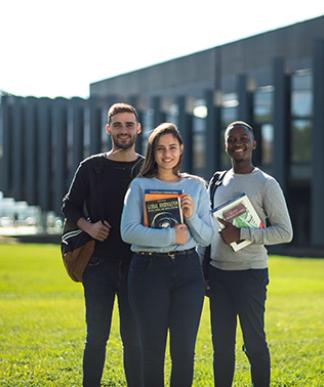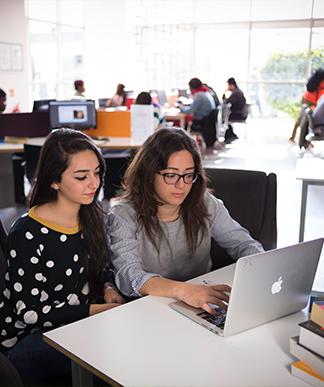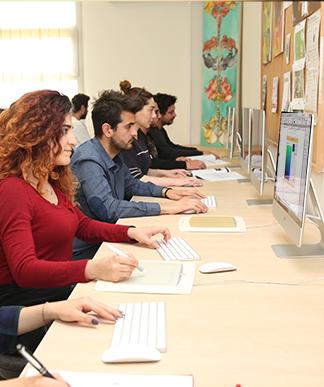Communication and Media Studies (MA)



About the Department
The Communication and Media Studies Doctoral Program at CIU has been designed to enable students to make in depth explorations of the major social, cultural and political issues which arise from mass communication. After completing a range of specialist preparatory courses, students will produce a thesis that is intended to make substantial and original contribution to their field of study. The main objective of the program is to educate students capable of producing original ideas and communicating these ideas effectively to students and their academic peers. Graduates of the program will be able to analyse and discuss contemporary developments and theories within various fields related to mass communication, including film and television, journalism, public relations, advertising, and social media.
Education Opportunities
The program is designed to offer students courses that focus on the use and impact of the new media as well as a variety of elective courses including Political Communication, Popular Culture and Media, the Media Organizations Management, Institutional Communication, Comparative Communication Systems, Film Aesthetics, Science Fiction Film and Literature, Contemporary Television Studies, Media and Audience Research, and Media History which allow students to improve themselves according to their own fields of interest. The program allows students to choose between the thesis and the non-thesis options to complete their degree. Students who join the thesis program are required to take and successfully complete 7 courses and 1 seminar course and write a thesis with an assigned supervisor. Students who prefer the non-thesis program are required to successfully complete 10 courses and write a comprehensive graduation project.

Career Areas
The Communication and Media Studies Doctoral Program is designed to raise Ph.D. graduates who wish to reach the highest level in their field, having produced an original thesis related to the area of communication and media. The program also aims to instill knowledge and skills to the high standard necessary for the field of professional communication.
Graduates of the program have the opportunity to pursue careers in the following fields:
-Academics in public or private educational institutions;
- Supervisors in the professional communication sector, editor, editor-in-chief, media planning specialist, correspondent/agent coordinator, senior media analyst, sales supervisor, advertising/commercial director, advertising/commercial agent, budget analyst, representative for field sales, and video editor;
- High-ranking manager in public relations and advertising agencies;
- Manager in film and video production companies.
Contact
Institute of Graduate Studies and Research
Graduate Sciences and Education Center, GE106
Tel: +90 392 671 1111 Extension: 2776
Institute E-mail: ciu-institute@ciu.edu.tr
Compulsory Courses
First Semester
THEORIES OF COMMUNICATION
Course code
COMM505Credit
3Theoretical
3Practical
0Ects
8ELECTIVE I
Course code
COMM5X1Credit
3Theoretical
3Practical
0Ects
8ELECTIVE II
Course code
COMM5X2Credit
3Theoretical
3Practical
0Ects
8ELECTIVE III
Course code
COMM5X3Credit
3Theoretical
3Practical
0Ects
8Second Semester
NEW COMMUNICATION TECHNOLOGIES
Course code
COMM510Credit
3Theoretical
3Practical
0Ects
8SEMINAR
Course code
COMM590Credit
0Theoretical
0Practical
0Ects
4ELECTIVE IV
Course code
COMM5X4Credit
3Theoretical
3Practical
0Ects
8ELECTIVE V
Course code
COMM5X5Credit
3Theoretical
3Practical
0Ects
8Third Semester
THESIS
Course code
COMM500Credit
0Theoretical
0Practical
0Ects
60Elective Courses
ORGANIZATIONAL COMMUNICATION
Course code
COMM508Credit
3Theoretical
3Practical
0Ects
10MEDIA HISTORY:TEXTS AND CONTEXTS
Course code
COMM532Credit
3Theoretical
3Practical
0Ects
10SCIENCE FICTION FILM AND LITERATURE
Course code
COMM531Credit
3Theoretical
3Practical
0Ects
10FILM AESTHETICS
Course code
COMM513Credit
3Theoretical
3Practical
0Ects
10COMMUNICATION SYSTEMS
Course code
COMM507Credit
3Theoretical
3Practical
0Ects
10MESSAGE DESIGN AND MEDIA MANAGEMENT
Course code
COMM503Credit
3Theoretical
3Practical
0Ects
10MEDIA PLANNING FOR BUSINESS
Course code
COMM512Credit
3Theoretical
3Practical
0Ects
0USES OF MEDIA IN POLITICAL COMMUNICATION
Course code
COMM504Credit
3Theoretical
3Practical
0Ects
10POPULAR CULTURE AND MEDIA
Course code
COMM511Credit
3Theoretical
3Practical
0Ects
0RESEARCH METHODS IN COMMUNICATION
Course code
COMM501Credit
3Theoretical
3Practical
0Ects
10RESEARCH METHODS
Course code
SOSC501Credit
3Theoretical
3Practical
0Ects
8MARKETING STRATEGIES
Course code
BUSN532Credit
3Theoretical
3Practical
0Ects
8STYLISTICS
Course code
ELLE505Credit
3Theoretical
3Practical
0Ects
8INTEGRATED MARKETING COMMUNICATION
Course code
ADPR428Credit
0Theoretical
0Practical
0Ects
0MEDIA LAW AND ETHICS
Course code
JRN242Credit
0Theoretical
0Practical
0Ects
5Political Economy and Media
Course code
COMM457Credit
0Theoretical
0Practical
0Ects
5QUALITATIVE RESEARCH METHODS
Course code
COMM515Credit
3Theoretical
3Practical
0Ects
MEDIA EFFECTS AND AUDIENCE STUDIES
Course code
COMM520Credit
3Theoretical
3Practical
0Ects
0MEDIA AND INTERNATIONAL CONFLICT
Course code
INRE561Credit
3Theoretical
3Practical
0Ects
JOURNALISM CASE STUDIES
Course code
JRN450Credit
0Theoretical
0Practical
0Ects
FILM ANALYSIS
Course code
RTV342Credit
0Theoretical
0Practical
0Ects
STRATEGIC MANAGEMENT
Course code
BUSN509Credit
3Theoretical
3Practical
0Ects
8ORGANIZATION AND MANAGEMENT
Course code
BUSN513Credit
3Theoretical
3Practical
0Ects
8HISTORY OF CINEMA
Course code
RDTV461Credit
0Theoretical
0Practical
0Ects
4LITERATURE AND LANGUAGE
Course code
ELLE501Credit
3Theoretical
3Practical
0Ects
8ORGANIZATION BEHAVIOUR
Course code
BUSN566Credit
3Theoretical
3Practical
0Ects
7MEDIA LAW AND ETHICS
Course code
COMM242Credit
0Theoretical
0Practical
0Ects
0DIFFUSION OF INNOVATIONS AND COMMUNICATION
Course code
COMM628Credit
3Theoretical
3Practical
0Ects
8HUMAN RESOURCE MANAGEMENT
Course code
BUSN512Credit
3Theoretical
3Practical
0Ects
8INTEGRATED COMMUNICATIONS
Course code
COMM617Credit
3Theoretical
3Practical
0Ects
10TYPOMORPHOLOGICAL ANALYSIS IN URBAN STUDIES
Course code
ARCH536Credit
3Theoretical
3Practical
0Ects
CONSUMER BEHAVIOR
Course code
BUSN535Credit
3Theoretical
3Practical
0Ects
SOCIAL GENDER AND MEDIA
Course code
COMM606Credit
3Theoretical
3Practical
0Ects
0RHETORIC
Course code
COMM612Credit
3Theoretical
3Practical
0Ects
SHORT STORY ANALYSIS
Course code
ELLE509Credit
3Theoretical
3Practical
0Ects
8THE POLITICS OF MEDIA REPRESENTATION
Course code
COMM623Credit
3Theoretical
3Practical
0Ects
10RESEARCH METHODS
Course code
EMNT525Credit
3Theoretical
3Practical
0Ects
0SPACE, PLACE AND PLACE - MAKING
Course code
ARCH541Credit
3Theoretical
3Practical
0Ects
Students who are interested in pursuing advanced graduate studies leading to a master’s, doctoral degree, or professional doctorate degree for the Fall and Spring semesters every year. Applicants can directly apply online to our graduate programs using the application portal.
TRNC Applicants- Required documents:
- Bachelor’s Degree Diploma
- Bachelor’s Degree transcripts for each completed academic term/year.
- Documents to prove English proficiency for English language departments,
- Scanned copy of passport or identity card.
Click for detailed admission requirements information.
Students who are interested in pursuing advanced graduate studies leading to a master’s, doctoral degree, or professional doctorate degree for the Fall and Spring semesters every year. Applicants can directly apply online to our graduate programs using the application portal.
International Applicants- Required documents;
- Bachelor’s Degree Diploma
- Bachelor’s Degree transcripts for each completed academic term/year.
- Evidence of English Language competence: TOEFL (65 IBT) or IELTS (5.5). Students without these documents will take the CIU English proficiency exam on campus following arrival.
- Scanned copy of international passport/birth certificate
- CV
- Fully completed and signed CIU Rules and Regulations document (which can be downloaded during the online application)
Click for detailed admission requirements information.
Cyprus International University provides academic scholarships for its students as an incentive for success, with most students benefiting from 50%, 75% or 100% scholarships or discounted tuition fees. Click for more information.
Tuition Fees are determined at the beginning of each academic year. Candidate students who are entitled to enroll in CIU can learn their fees in line with the Tuition Fee Calculation system.